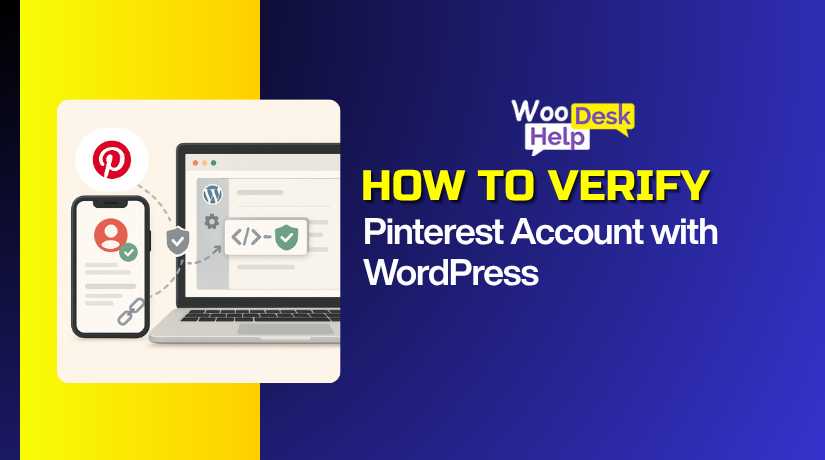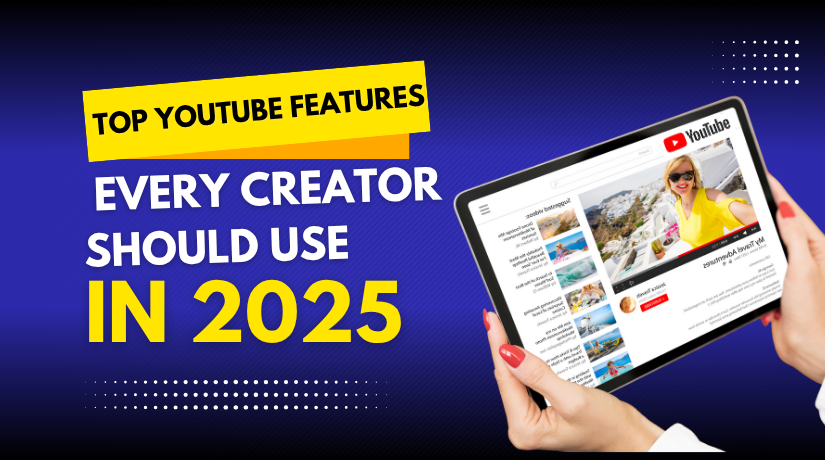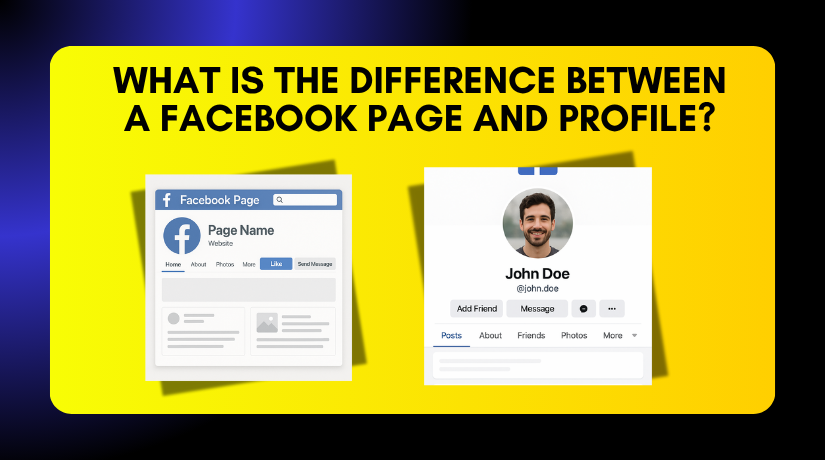
What is the Difference Between Personal and Business Accounts on Instagram
Table of Contents
- Introduction
- Understanding Instagram Personal Accounts
- When Should You Use a Personal Account?
- What is an Instagram Business Account?
- When Should You Use a Business Account?
- Key Differences Between Personal and Business Instagram Accounts
- How to Decide Which Instagram Account Type Is Right for You
- Conclusion
Introduction
Instagram is among the most popular social media sites worldwide. It makes it easier for people and companies to reach a worldwide audience. Making the correct Instagram account type choice is essential to reaching your objectives. Whether you are an influencer, a brand, or just a casual user, selecting the right account will allow you to access the features that best suit your needs.
There are two primary types of Instagram accounts: personal and business accounts. Each has its own set of features designed for different purposes. In this post, we’ll explore the differences between these two account types and help you decide which one is right for you.
Understanding Instagram Personal Accounts
A personal Instagram account is intended for regular users who wish to interact with friends and family and share details of their personal lives. Individual users most often have this kind of account. By creating a personal account, you have the ability to manage who may view your postings and share images, videos, and narratives with your followers.
Key Features of a Personal Instagram Account:
- Privacy Control: Personal accounts allow users to set their profiles to private, ensuring only approved followers can view posts and stories. More privacy and control over who can view your stuff are so guaranteed.
- Simple Profile Setup: The account setup process is straightforward with no additional business-related features. It’s designed for easy use and casual sharing with friends and family.
- Limited Features: Personal accounts do not include business tools like ads, insights, or Instagram Shopping. The focus is on organic, non-commercial content sharing.
- Content Sharing: Users can upload photos, videos, and stories. Content is often personal, focusing on lifestyle, hobbies, or sharing life updates with friends and family.
- No Business Insights: Personal accounts lack access to analytics. There are no performance metrics or audience insights, so engagement is based purely on interactions from followers.
- Followers and Engagement: Personal accounts are for interacting with known followers, including friends, family, and acquaintances. The engagement is more informal, without business-driven metrics.
- Interaction Ease: Liking, commenting, and direct messaging are simple and social. There’s no pressure for professional engagement or content optimization.
- No Contact Information: Personal accounts don’t allow adding professional contact details like email or phone numbers. It’s strictly a personal profile, designed for social connection, not business.
- No Ad Options: Personal accounts do not have the option to run paid advertisements. Content is shared and engaged with on an organic basis, without any promotional tools.
When Should You Use a Personal Account?
For casual users who wish to maintain relationships with friends and family, a personal Instagram account is ideal. In these situations, a personal account is best.
- For Casual Social Interaction: Use a personal account if you want to share photos, videos, and stories with your close friends and family without the pressure of professional branding.
- To Maintain Privacy: If you prefer keeping your content private, a personal account lets you control who sees your posts by making your profile private and only approving trusted followers.
- For Hobbyists and Creators: If you’re sharing personal hobbies, creative projects, or lifestyle updates without the goal of making a profit, a personal account allows you to engage without business tools.
- To Build Personal Relationships: If you’re focused on connecting with friends and family, a personal account is perfect for building and maintaining meaningful, informal relationships through likes, comments, and messages.
- If You’re Not Interested in Ads: If you don’t want to run ads or promote content, a personal account offers a straightforward experience for organic, non-promoted sharing with your audience.
- For Content Without Commercial Intent: Use a personal account if your content is purely for fun or personal expression, not intended to promote products, services, or build a brand presence.
- If You Don’t Need Analytics: Personal accounts are suitable if you don’t require in-depth analytics or insights into your audience. It’s ideal for those who simply enjoy social sharing without tracking performance.
- To Keep Things Low-Key: If you’re not looking for professional tools or want to avoid marketing tactics, a personal account keeps your Instagram experience relaxed and simple.
What is an Instagram Business Account?
Instagram business accounts are intended for companies, brands, and artists who wish to maintain a polished online presence. This account type gives you access to advanced features, such as analytics, Instagram Shopping, and the ability to run ads.
Key Features of a Business Instagram Account
An Instagram business account offers several features designed to enhance marketing, engagement, and customer interactions. Here are the key features:
- Professional Profile: Display your business category, location, and contact details, making it easier for customers to connect with you.
- Instagram Insights: Gain access to detailed analytics on your posts, stories, and audience, helping you improve content strategies.
- Advertising Capabilities: Run ads directly on Instagram to reach targeted audiences, promoting your products, services, or events effectively.
- Instagram Shopping: Tag products in your posts and stories, allowing users to shop directly from your Instagram profile.
- Contact Information: Add contact options like email, phone number, and address, making it easy for customers to reach you.
- Call-to-Action Buttons: Customize your profile with action buttons like “Contact,” “Shop Now,” or “Book Now” for easy conversions.
- Promotions and Offers: Create special offers and promotions to engage your audience and encourage them to take action.
- Multiple Admin Access: Allow team members to manage the account, ensuring smooth collaboration in running your Instagram business.
- Facebook Integration: Link your Instagram business account to your Facebook page for cross-platform management and easier campaign creation.
- Link in Bio: Add a clickable link in your bio to drive traffic to your website, landing pages, or promotions.
When Should You Use a Business Account?
A business Instagram account offers several advantages for brands and creators. Here are situations when you should use one:
- If You Want to Promote Products or Services:
Use a business account if your goal is to promote and sell products or services directly on Instagram. - When You Need Access to Analytics:
A business account gives you valuable insights into your audience’s behavior and content performance, helping optimize strategies. - If You Plan to Run Ads:
If you want to run Instagram ads to reach a larger audience, a business account is essential. - When You Want to Enable Instagram Shopping:
A business account allows you to use Instagram Shopping, enabling users to buy directly from your posts and stories. - If You Need to Add Contact Information:
Business accounts let you add email, phone number, and address, making it easier for customers to contact you. - If You Want to Offer Promotions:
If you plan to run discounts, giveaways, or special offers, a business account helps you engage customers effectively. - When You Need Multiple Users Managing the Account:
A business account allows multiple team members to manage your Instagram page, making it easier to collaborate and maintain consistency. - If You Want to Link to Your Facebook Page:
A business account can be linked to your Facebook page, making it easier to run cross-platform campaigns and manage posts. - When Your Brand Needs Professional Features:
A business account provides tools like call-to-action buttons and a professional profile, helping elevate your brand’s presence.
Key Differences Between Personal and Business Instagram Accounts
Instagram offers two types of accounts: personal and business. Each has its own set of features and tools. Below is a more detailed comparison to help you decide which account type suits your needs.
Key Differences Between Personal and Business Accounts
- Profile Setup and Features
- Personal accounts offer basic features for individuals.
- Business accounts provide professional features, including a business category, contact buttons, and location, which helps improve visibility and communication for businesses.
- Analytics and Insights
- Personal accounts lack access to Instagram Insights, which means you can’t track post performance or audience data.
- Business accounts provide access to Instagram Insights, allowing users to monitor engagement, reach, and detailed audience demographics to optimize their content strategy.
- Advertising Capabilities
- Personal accounts cannot run ads or boost posts.
- Business accounts allow you to run ads, creating targeted campaigns to reach specific audiences based on demographics, interests, and behaviors.
- Instagram Shopping
- Personal accounts do not have the option to tag products or use shopping features.
- Business accounts have access to Instagram Shopping, allowing users to tag products in posts and stories for direct purchases within the app.
- Contact Information and CTA Buttons
- Personal accounts do not allow detailed contact information like phone numbers or emails, and lack CTA buttons.
- Business accounts allow you to add contact information (email, phone, address) and include customizable call-to-action (CTA) buttons such as “Contact Us” or “Shop Now.”
- Business Profile Label
- Personal accounts have no label to identify their purpose or industry.
- Business accounts automatically display a business label that indicates the type of business, like “Restaurant” or “Photographer,” making it easier for users to identify your business.
- Multiple User Access
- Personal accounts are restricted to a single user with no options for shared access.
- Business accounts allow multiple people to manage the account, giving team members different roles for handling content, customer service, and marketing efforts.
- Professional Tools
- Personal accounts do not have tools for scheduling posts, running ads, or boosting content.
- Business accounts offer professional tools like scheduling posts, accessing advanced analytics, boosting posts, and utilizing advertising options for marketing purposes.
- Linking to Facebook
- Personal accounts cannot be linked to a Facebook page for cross-platform management.
- Business accounts can be linked to a Facebook page, which allows for easier cross-platform sharing and management of both Instagram and Facebook campaigns.
- Content Monetization
-
- Personal accounts do not have built-in monetization tools, such as affiliate links or product tagging for purchases.
- Business accounts can utilize Instagram’s monetization features, including selling products directly via Instagram Shopping, affiliate marketing, and promoting sponsored posts.
- Branding Opportunities
-
- Personal accounts are primarily for social sharing, with no tools to support branding efforts.
- Business accounts support branding with tools like branded content ads, business profile tags, and post promotions to enhance your brand presence.
- Verified Badge
-
- Personal accounts can request verification, but it’s harder to obtain.
- Business accounts are more likely to be verified, especially if they are a notable brand or public figure, making it easier for users to find official accounts.
- Business Collaborations and Partnerships
-
- Personal accounts don’t provide formal options to collaborate with brands.
- Business accounts offer collaboration tools such as influencer partnerships and promotional deals, allowing businesses to engage in affiliate marketing or other collaborations with creators.
How to Decide Which Instagram Account Type Is Right for You
Choosing the right Instagram account type is important to ensure you get the most out of the platform, whether you’re using it personally or professionally. Here’s a detailed guide to help you decide between a personal or business account based on your goals and needs.
- For Personal Use:
If your goal is simply to stay connected with friends and family or share personal updates, a personal account is the best choice. It allows you to share photos, videos, and stories with those you approve, without any commercial intent. You can set your account to private, ensuring that only your followers can see your content. A personal account is perfect for individuals who don’t need business features like ads, analytics, or professional branding tools.
- Best for: Sharing personal updates, staying in touch with friends, and having control over privacy.
- Features: Basic profile setup, privacy controls, and simple content sharing.
- For Business Promotion:
If you’re running a business or want to promote products or services, you should switch to a business account. This type of account provides access to advanced features like Instagram Shopping, where you can tag products directly in your posts and stories. Additionally, business accounts allow you to run ads, track performance through Instagram Insights, and gain a better understanding of your audience’s behavior. These features help you reach a larger audience and grow your customer base.
- Best for: Promoting products or services, reaching a wider audience, and increasing brand visibility.
- Features: Instagram Shopping, paid ads, and detailed performance analytics.
- For Influencers or Content Creators:
If you’re an influencer or content creator looking to build a personal brand, a business account is essential. It allows you to track audience engagement, collaborate with brands, and access advertising tools. Business accounts also offer Instagram Insights, which helps you measure how your content performs, allowing you to optimize your strategy. If monetizing your content is a goal, a business account makes it easier to work with brands and promote sponsored content.
- Best for: Building a personal brand, collaborating with brands, and monetizing content.
- Features: Analytics, collaborations with brands, and advertising tools.
- For E-Commerce or Selling Products:
If you plan to sell products directly on Instagram, a business account is a must. Instagram Shopping enables you to create a product catalog and tag items in your posts. This allows followers to easily shop your products directly from Instagram. A personal account does not offer this feature, making it less suitable for businesses looking to generate sales on the platform. A business account provides all the tools you need for setting up an online store within Instagram.
- Best for: Selling products directly on Instagram through posts and stories.
- Features: Instagram Shopping, product tagging, and direct purchasing options.
- When You Want Privacy Control:
If you prioritize keeping your content private and only want to share with select individuals, a personal account is the better option. You have complete control over who follows you and views your material when you use a personal account to make your profile private. If you’re not looking to run ads or promote a business, a personal account gives you the flexibility to enjoy Instagram without the professional tools.
- Best for: Maintaining privacy and sharing content with a limited audience.
- Features: Private profile, restricted access, and casual sharing.
- If You Plan to Run Ads or Promotions:
If you want to conduct Instagram promotions or ads, you must have a business account. Personal accounts cannot run ads or boost posts. You can use a business account to develop ad campaigns that are specifically targeted to viewers based on their demographics, location, and interests. Ads help increase visibility and drive more traffic to your website or products, making it a crucial feature for businesses looking to grow their presence.
- Best for: Running ads, promotions, and reaching new audiences.
- Features: Paid advertising options, ad targeting, and promotion of posts.
- For Tracking Performance and Engagement:
If tracking the performance of your posts and understanding your audience is important, a business account offers Instagram Insights. This tool provides valuable data on your posts, stories, and audience. You may track engagement, determine which content your audience responds to the best, and modify your approach accordingly. The inability of personal accounts to access these metrics restricts your ability to gauge success.
- Best for: Tracking content performance and understanding audience behavior.
- Features: Instagram Insights for engagement, reach, and audience analysis.
- For Professional Branding:
A business account is required if you wish to present your account in a professional manner.It allows you to customize your profile with business details, including your business category, contact information, and call-to-action buttons like “Contact” or “Shop Now.” This setup helps customers immediately understand what your business is about, making your profile more professional and trustworthy. Personal accounts lack these features and are more suited for personal use.
- Best for: Establishing a professional brand identity and gaining trust from followers.
- Features: Business category, contact options, and professional appearance.
- For Collaboration and Team Management:
If you have a team helping you manage your Instagram account, a business account is the right choice. Business accounts facilitate collaboration by enabling numerous users to access and control the account. You can assign different roles to team members, such as content creators or customer service representatives, to streamline operations. Personal accounts are limited to one user, making them unsuitable for businesses or teams.
- Best for: Managing an account with a team or multiple users.
- Features: Multiple user access, team management, and collaboration tools.
Conclusion
The type of Instagram account you choose is essential to reaching your objectives, whether they be personal or professional. If you’re someone who simply wants to stay connected with friends, share personal moments, or maintain privacy, a personal account will suit your needs perfectly. It gives you complete control over who may see your content and is simple to use.
However, if you’re looking to promote a business, grow your brand, or track content performance, a business account is the better option. With features like Instagram Shopping, ads, and detailed analytics, a business account offers all the tools you need to expand your reach and engage effectively with your audience.
By carefully evaluating your goals—whether it’s for personal sharing, building a professional brand, or selling products—you’ll be able to make the best decision. Understanding the differences between personal and business accounts helps ensure you choose the right account type to meet your needs, whether you’re an influencer, entrepreneur, or simply looking for a better social media experience.




